EurasianStudies_0110..
EurasianStudies_0110..
EurasianStudies_0110..
Create successful ePaper yourself
Turn your PDF publications into a flip-book with our unique Google optimized e-Paper software.
January-March 2010 JOURNAL OF EURASIAN STUDIES Volume II., Issue 1.<br />
_____________________________________________________________________________________<br />
1.2. The name hungar came from Turkish languages<br />
The ethnonym is primary and the name of the territory is secondary. The ugor was a western Turkish<br />
language, and the ugor came from unnugur. The ugors were in contact with Turkish people for 500 years<br />
in the East from the curve of the Volga River. Jugria keeps the memory of the Bulgarian-Turkish people<br />
from the Ural region. The most ancient variant is the form Ugra, and j- as a front vowel is a normal<br />
Russian result, Syrjan forms Jögra, Jogra are from Russian (NÉMETH 1991:22, 142). The form ugra is more<br />
original and the jugra is a following. The obi-ugor was the name as a summary name of the Vogulish and<br />
Ostjakish people. The Turkish form onogur came from ongur as an old Russian name of Hungarian people<br />
and sounded ongri around the 9 th century in the old Russian. The following unnasalised forms ugre, ugri<br />
are names of Hungarian people in the Russian Chronicles. The borrowing of the form onogur was in<br />
South-Russia, but the borrowing of the form jugor was in the North of the Ural region. The begining j- of<br />
Jugra was in other Russian word too, but the ending -a is the affix of the region and of the ethnonyms, the<br />
same as the ending -a of the following words: merja, muroma, cseremisza, Obdora. The name Jugra is a<br />
faultless derivation and its meaning is nation `Vogulish-Ostjakish` (ZSIRAI 1928-1930:446). The<br />
Hungarian people could borrow the name onogur, ugor from onogur people in the region Kuban and from<br />
the Bulgarians in Volga region. The Magyars had 4 influences of Bulgarian language: 1. The Magyars<br />
moved to the latest Bashkir-Volga-Bulgarian region around 500 A.D. 2. During the 9 th century in the land<br />
Pontus. 3. The influence of the Bulgarians from the Kasar land. 4. The influence of the Kavars.<br />
(CZEGLÉDY 1976:82-89). The onogurs appeared in the forefront of the Caucasus in the year 463, after<br />
them the Sabirs in the delta of Volga. The Kasars became stronger again and the ogurs migrated<br />
(CZEGLÉDY 1981:57-70).<br />
RÓNA-TAS András expressed his views about the ugor problem from a grammatical and historical<br />
point of view. We know from the sources that from 460 A.D. on the western shores of the Ural River<br />
groups of ogur or ugur people appeared, speaking r- Turkish that is a Chuvash type of Turkish language.<br />
This group came from the East, from the Kazakh steppe, so we must exact: where came the ogurs from.<br />
(RÓNA-TAS 1986:177).<br />
1.3. Other opinions<br />
According to sources jugars are ancient people related to huns and Magyars. Jugria is the ancient land<br />
from where huns and Magyars moved to Pannonia. Jugria and ogur are the same. (GOMBOCZ 1923:171-<br />
191). Juγur had previously the form ujiγur, from that could come ujγur and juγur (LIGETI 1931:300-314).<br />
Outskirts of Meotis, the patria Onogoria is the west side of the Kasar Empire. Ancient Hungarian people<br />
did live in this region in dependency of Kasars not in the time of Levedi but earlier. (LIGETI 1931:362).<br />
The name Jugra first occured in the Muslim, Arabic-Persian geographical literature in the 11-13 th<br />
centuries. The old Russian form could be onogur. The Hungarian peoples´ name was ugry but the name<br />
of Ural people was jugra. First the Onogur `Hungaria` can be located in South Russia and secondary<br />
Onogur in the Northern part of the Ural region as an ancient home of Magyars. We have to explain Jugra<br />
from ujgur. (VÁSÁRY 1982:247-259).<br />
There are different suggestions about the origin of the ethnonym hungar, but they all have problems<br />
(see RÓNA-TAS 1996:209-242).<br />
_____________________________________________________________________________________<br />
© Copyright Mikes International 2001-2010 73

















